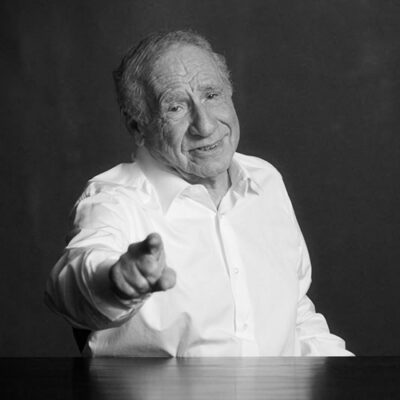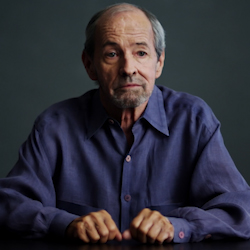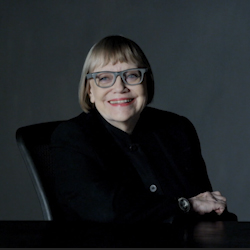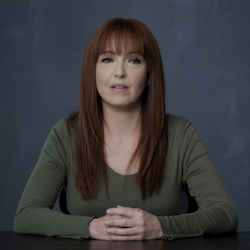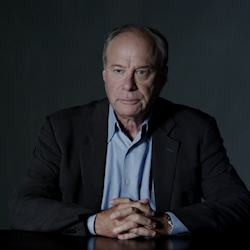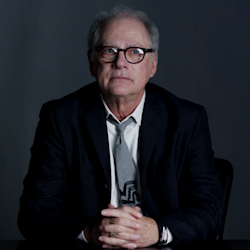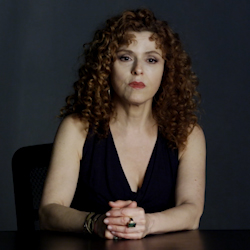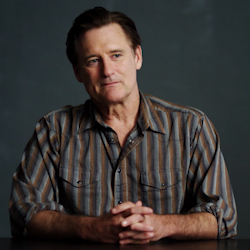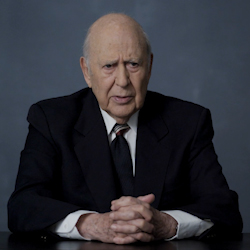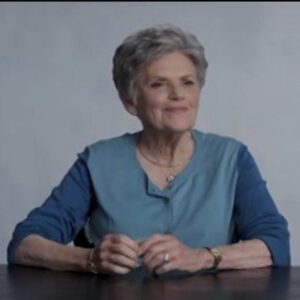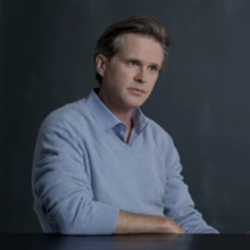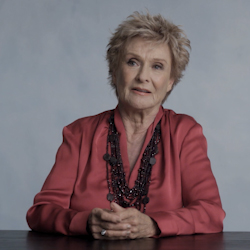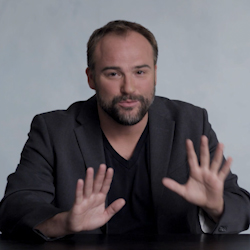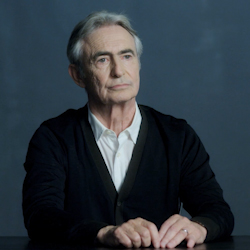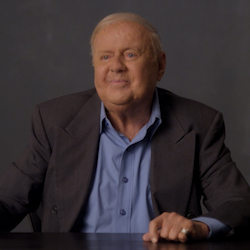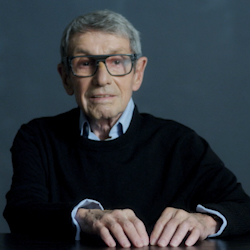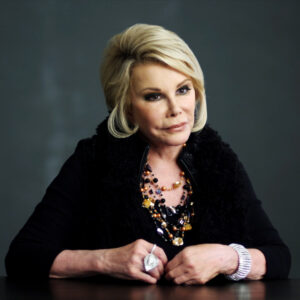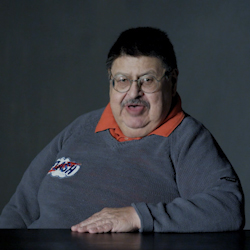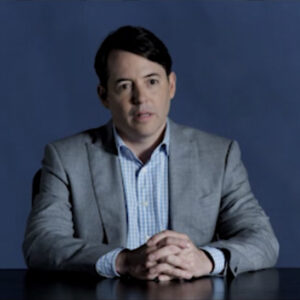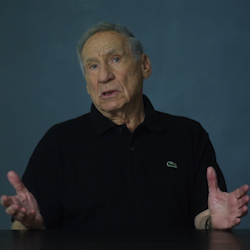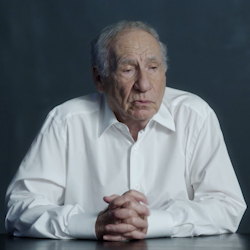Interviewer: All right. Mel told me to ask you. Well, I guess we should be starting at this start about chockful and not. So is that where you met?
Norman Steinberg: Yeah, I was I was a lawyer and at Two Hundred West 57 Street and Chockful and Nuts, which was I guess our Starbucks of that day, was across the street and every morning I would go in and get coffee. And I would run into Mel. And he was obviously was my hero and I would pester him and they said, I want to be a lawyer. I want to be alive a skills.
Interviewer: Let’s start at the top and actually look, Chico, when you go back to just one thing. Do you want to come right there to cover on the air? Yeah, from the back. OK. And this garbage. OK. And good. OK, so start again.
Norman Steinberg: Yes, it was late 60s and.
Interviewer: For what it’s like how to stop for one second. I’m just making you as pretty as possible. See right here, the fly away. Right.
Norman Steinberg: OK. Here we are.
Interviewer: And go.
Norman Steinberg: It was late 60s and I was a lawyer making upwards of one hundred dollars a week as a copyright lawyer. And every morning I would go for breakfast at chock full of nuts. And every morning I would run into Mel Brooks. And he was my hero. And I started to pester him and I said, Mel, I’m a lawyer. I hate myself. I want to be a writer. And he said, look. I’ve got a coffee and a cruller. I’m broke. OK, I got a rich wife, but I’m broke. You don’t want to. You don’t want to be a writer. Be a lawyer. And finally, one day he handed me a piece of paper. He said, here, call this guy. And it was the producer of Get Smart, which he created with with Buck Henry, and he said, call him, tell him we want to write a script. I’ve already spoken to him. And it was a guy named Leonard Stern and he said write a script for the show. Send it to me. And sure enough, I did that and I got a letter back from another writer named Chris Hayward saying, We love your script. However, the show is being canceled. And at the end of the letter, it said, keep writing right. Anything. And that was enough for me. And it was it was a Saturday when I got that letter. And on Sunday night, I went up to the office and my boss was still working in a suit and tie at his desk Sunday night. And I quit. And that was it.
Interviewer: So how long before you actually got to work with Mel?
Norman Steinberg: Well, we did. I went out from there. I started my career started and I got very lucky. I got I got a job on a writing a comedy album for an impressionist named David Fry. And it was called I Am the President. It was. It was a concept album about LBJ leaving the White House and Richard Nixon coming in. And this guy, David Frei, could do anybody. He was he was spectacular. And that album won a Grammy. And then from there, I got a job on the Flip Wilson Show. And the Flip Wilson. That was great. That was in Hollywood. And I was out there and the show and I got an Emmy for four. So in in a year and a half. I had a go at. Well, I had worked on a Grammy winning album. And an Emmy Award winning album. But an Emmy Award winning television show. But I. I didn’t want to be in Los Angeles. And so I quit after the year was up. And I said, I’m coming back. And I came back to New York and I got a job doing a special called Aquacade in Acapulco. And Mel was on the specialists. And what are you doing here? I said, I need the money. We we went to Mexico in Acapulco for 10 days, and it was spectacular when we spent 10 days. My wife, my then wife and I spent 10 days in Acapulco with Mel Brooks and a pregnant Anne Bancroft. And I was in heaven. And while there, we wrote a sketch together. And Mel said, I want to work with you. And I was flabbergasted. And he said, when we get back to New York, let’s go for dinner. Well, we got back to New York the first night. And my phone rang and it was Mel. And he said, let’s meet at palazzos on the on Housen Street. And that’s where it started and he handed me Andrew Bergman script. Then he said, What do you think? And the script was called TECs X. And it was it was the or text of Blazing Saddles, and that’s where it’s that’s where we started.
Interviewer: So. You’re on Blazing Saddles. Tell us who’s in the writer’s room with you.
Norman Steinberg: On on Saddle’s.
Interviewer: Yeah.
Norman Steinberg: Oh, well, you know, to begin with. Well, we had I had a partner at the time and I brought him along with me. I said, can I bring him in? Mel said, Sure. While he was gone within a week. But he said now uses his words. He said, writing a film about a black sheriff in the old West. We need a colored guy. That’s. And I said, Well, funniest black man I know is Richard Pryor, with whom I worked on. On. The Flip Wilson Show. So I called Richie and I said, Richie, we’re writing a film. It’s just it’s a big send up of the West and it’s with Mel Brooks. And I just heard Mel, Brooke, Mel, Brooke. I’m in. I need train fare. And so they sent one another, send the train fare. And in he came in the first day we we all assembled. And Richie was a bit of a wild card, as you might imagine. So we were sitting there and it was 10 o’clock. Six six six Fifth Avenue Warner Brothers offices. And then it was eleven o’clock. Then it was eleven thirty. And the door opened. Then there he was. And he was. It was Richard Pryor. And we sat down and he Mel said, well, let us tell you where we’re where we’re at. And here’s it’s a we’re in a town called Ridge Rock. Red Rock. We don’t know what the hell it was. And was then and Ritchie said a hot hot. And he put out a little. A little vial opened it up and a hot hot sauce and it started. And he was. I didn’t know what it was. I never used cocaine. I’m happily happy with his say. But then he he passed it to Mel and he said, Brother Mel. And Mel said never before lunch. And that’s and we were off and running and we ordered lunch and was a very good omen because the guy who came up to take our lunch order or to deliver our lunch order was from the stage deli was the same guy who delivered to your show of shows. So that was that was a very good omen. But when Richie ordered lunch, they said, What do you want? He said, I’m going to have a roast beef sandwich. And a bottle of Courvoisier. And so it went from there and he walked out straight as an arrow. But it was that’s the sessions were always insane. You never know how Richard was going to show up. And we were all in all of that. But we were in a room with. The two great sluggers of of American comedy, Richard Pryor, Mel Brooks, said it was it was paradise. And Andrew and I were Andrew Bergman and I was just starting out and we were in awe and thrilled. How could you not be?
Interviewer: Just got to be careful. I know that’s what makes a lot of noise. So if you’ve got one for you, I need you to say this because you said anybody will tell us you called him a Russian bear. Well, why?
Norman Steinberg: Mel?
Interviewer: Yeah.
Norman Steinberg: He’s because he because of his posture, of his background, we’re both we’re both Russian. I come I come from I my father came from Ukraine and I believe Mel’s Mel’s forebears did, too. And he. There’s something about him that that he is he’s so charged and he’s he is so volatile that he’s he is like he’s like a bear and and in and in the other and in the other sense, he’s also very cuddly. He’s been he’s been very nurturing to me. And, you know, he’s he’s my mentor. He’s he’s the guy who put me in place. He really did. And and we this legacy that we all came came away with, with his leadership, the Blazing Saddles legacy. But there’s a way he carries himself that and in his peer group. There are. He is so much more vital than everybody that they know that it’s going to take a truck to bring him down. And and that’s he he’s he’s stalwart. And I think that I’d be in a foxhole with him.
Interviewer: He said that. You actually twist a little clockwise or whatever it’s towards. Yeah. That’s just. There you go. Perfect. Richard. If the N-word is not a hot topic as hot button, the topic as it is today. But he gave you, Richard, sort of gave you permission, the right word to go ahead with that.
Norman Steinberg: We would have done it anyway. We would have done it anyway. And there were no strangely enough, there were no strictures on that kind of language. And we had a studio head named John Kelly who could roll with all of these punches, but we didn’t even think about it. The the issue of political correctness didn’t matter. And Andrew, Andrew Bergman, who created the original script, I mean, I think he he disagrees with me. But he once told me that he was inspired by a photograph using a photograph over his desk of Jimi Hendrix on a horse. And that did it. But there were we never gave it a second thought that we were going to be offending anybody. It was also the time of blaxploitation and along along the path to Blazing Saddles. There was another title, which was. Tax X, which we tossed out because we felt that it would smack of a black exploitation picture. So the you know, there were a lot like the theater I’d lived on St. Mark’s Place in the East Village during the I guess it was a psychedelic explosion, but there was a very healthy Negro ensemble theater, was there? There were black theater was very healthy. As I said, all these all these blaxploitation pictures. So the gloves were off. I mean, when you see Superfly and you see it when when it came out, you’d see this film and we were we were hearing music in films that we hadn’t heard before in Superfly, certainly Shaft. And you I saw Superfly at the Paramount Theater on Broadway. And that audience, that audience was evocative of of what we were doing and and then the audiences for Blazing Saddles were just they were just as raucous and they screaming at the screen and they were doing lines and. I’ll I’ll give you one that you can obviously can’t print. But at the end, the Superfly, when he he finishes he and he turns the tables on the police and walks back in the car. It goes to his Cadillac. Somebody got up and yelled, get in that car and roll my. And that that was that was a temper of the times, and especially I’m living in the East Village and the streets are full of everything. You know, all bets were off. Villages was going on down the street on St. Mark’s Place. There was another venue that the end. It was a time of of insanity, drugs and obviously and and you had old Calcutta things that so people were saying things they had never seen before. And I don’t think that there was any. I don’t think you could take a breath. I don’t think there was enough time to get upset about bad language or Easy Rider. We were speaking to a lot of. We were getting rid of a lot of frustration.
Interviewer: That movie couldn’t be made today. Right.
Norman Steinberg: Probably not. If it were, it’d be tough. I mean, you could you couldn’t get away with the language. You couldn’t get away with the N-word. You just couldn’t. You’d get slapped down. And you know, people. Well. Probably. Let me rephrase that. Because because the way that the way films are going today and given what studios do and this was a Blazing Saddles was a studio film. Given the way films get made today, maybe you could maybe call. Who cares? Who cares if it’s your financing? And a lot of these films that are that are just out there. Language wise and sexually. They get done, they get done, so they would take a lot of heat for sure.
Interviewer: You know, grab some water. You need some water.
Norman Steinberg: So, yeah, I don’t think it’ll be tough.
Interviewer: Richard left after a while.
Norman Steinberg: Three weeks he was gone after three weeks. He ostensibly he had run out of. He had run out of his drug of choice and wanted to go back to California. But while he was there, the fury came into the room and he opened our sinuses and no pun intended, he really and he would come in. It was it was it was theater. Because you never knew how he was going to show up. He was he’d come in and was rich. He was rich. And there he was. He was dressed as a maid and he had a headache. He’d show up and in uniform. And every day was another thrill. But he was non-stop, hilarious. And it was like watching. It was like watching Wimbledon because he’d hit it over the net and Melwood hit it right back. And and it was everybody was laughing.
Interviewer: I read a quote by you that I literally need you to spit back to me because it’s a great quote, which was a. Tell me when you’re in place. Doing good. Which is in the room, everyone. This is everyone’s function was to be brave, to not fear failure.
Norman Steinberg: Everyone’s function was to be.
Interviewer: To be brave, to not fear failure, to throw out ideas in the room. I mean, that was something I just heard you say the other day.
Norman Steinberg: Well, it’s, you know, to get back to the Russian bear. Characterisation, Mel was also capable of great anger. And you knew you know, that if you could take the punch that he would respect. Scuse me.
Interviewer: You know, you don’t reload. And so we’re going to reload anyhow. All right. Pick it up from always capable of great anger.
Norman Steinberg: From where?
Interviewer: Mel was capable of grading.
Norman Steinberg: Well, you know, it was we we were inspired to push the limits to kind of say envelope here, but we were inspired to push the limits because. And Mel, Mel once said this about John Belushi, which I thought was so characteristic of him. He said he will do anything, anything for a laugh. And I think Mel was also speaking about himself. And, you know, the R by word or by our phrase, our mantra was funny is money. And we pushed it. And we never there was never a moment where you couldn’t say something in that room that. No. No matter how outrageous it was and not and and not be not be respected for it. So we will push to do that. The other dynamic that was going on was that. The. The relationship that we had after Richard left, it was Mel and Andrew and myself, and we spent all of our time together, and not only did we not only do we spend time in the room, but we then walked from Fifth Avenue in the 50s down to Chinatown for dinner. And we did that almost every night. So we were we we were a unit and we could see Mel. And there were times, as I said, Mel was capable of great anger. But you knew that no matter how angry he got with you. Underneath, it was this abiding love, because, frankly, we were we were all we were hauled just swimming to the surface. Mel included he a he was coming off two wonderful films, but films that did not turn a profit. And he was in his own head was I think he considered himself a failure. And add to that point. And, you know, you can’t you can’t show in the film and say, no, you’re a genius. But but I, I think that this was we were we were all scrapping for our existence and and a life in life that we wanted badly. And and because of that, there was a lot of tension. And I think it produced just great work. We threw out so much so much stuff that was wonderful that that that came through, that there’s so many drafts of that script. And I’ll give you an instance of of the anger. Is is that. We had a character named Ashtray. An ashtray appeared in the film when Harvey Korman walked over to table and there was an ashtray at the table and he flicked his cigar and you said ashtray s tray and the ashtray disappeared. And an out from under the table came this little person. Used to be known as midgets with an ashtray for a hat. And he had a wooden neck and and he communicated with the world by knocking on his neck and then he would bite people in the ankle. And this was inspired. Mel loved the the harmonica rascal’s. And there was this guy named Johnny Puleo, and he would literally bite people in the ankle. But it was a grotesque character and fun. And I would walk home with Mel and I’d say, let’s get rid of it. People going to hate that. We’re making fun of this midget. It’s not right. Not right. And he persisted and persisted until one day he wheeled on me and he said, All right, he’s out. He’s out. Leave me alone. That was it. And an ashtray died. We had we had a great affection for astri, but he was dead. And Mel. It melts her melt. I mean, he turned on me, but I was never in fear of him because he had created such great comedy. I knew there was always gonna be a laugh in there somewhere.
Interviewer: Well, let’s talk about his generation of writer, which is usually first generation American. Pretty well versed in music and literature, and as I’ve said to some of the other people he taught, differs from everyone else of that era because he’s not so many of them. Became concerned with the. Their comedy started becoming steeped in what was going on in their lives. Kids, wife for divorce, her mother in law, and he’s on a whole other plane. He’s operating on another plane, which is based in history and literature. And, you know, so can you talk about that?
Norman Steinberg: A lot of that. A lot of that. Also, you had to. I think you have to go back and look at your show of shows. And so much of that was steeped in this in the same in the same genres. Plus, you had this genius, the genius of Sid Caesar, who could morph into any nationality and, you know, another another Brooklyn guy who, you know. This was Andrews from Queens. And Mel and I are from Brooklyn and the later film that that we did together. Michael Grosskopf is from Brooklyn. And if you look you look at Woody Allen’s work as well. You see a lot of those same strains and at great literature coursing through that. I mean, the Twelve Chairs was what was a Russian was a Russian novel. The producers. Well, put that that we know where that came from and that. But his. He’s widely read and. And also, you know, coming from our tradition where we came from this. The especially the Russian tradition. The the great Russian literature. Tolstoy. Mel’s affectionate name for me is Needle Nose. Is he he he thinks I look like. She pushed. No.
Interviewer: Google. Google or Google?
Norman Steinberg: Yeah. Nikolai Gogol, he’s any. So he keeps calling. He calls me Nadler’s, but a lot of that stuff is, you know, the obviously growing up in Brooklyn in surrounded by Russian Jews, Eastern European Jews mainly. And so much of that humor and the Catskills. And then Sid Caesar and that whole group, Larry Gelbart and Carl, you know this they shared they shared a heritage. They swap stories. It that’s that’s where it all comes from.
Interviewer: This is a. Blazing Saddles. It’s an unusual. Love story, because it’s the two guys really, you know, who end up with each other at the end. It’s not a.
Norman Steinberg: Love story between Jane and Eli and Bart. Yeah, yeah. Well, two castaways to two derelicts to two outcasts from society, a drunk and and a black man who who had no place in society. And. Yeah. This part of that part of the Gene Wilder character, which I’m sure you’ve been taken through the odyssey of how about was cast? Part of that came from Dean Martin’s performance. And in Red River, he played the town drunk and. Interestingly enough, when we were looking for someone to cast that, Mel leaves this story out. But I went with him to The Tonight Show. And he asked Johnny Carson to play this role because he felt that Johnny Cooke could touch that the the sadness of of of the lush. Of the guy who who is alone at the end of the bar, just drinking away his troubles. And we couldn’t we couldn’t sell him on that. But would it mean it would’ve been an interesting choice. But. And I quite frankly, when he brought Gene Wilder into the room, I thought it was a desperation move. It seemed to me him, Gene, so cuties. And he’s got curly hair. He seems so ever. Bessant, it’s I said, I don’t see this one at all. But. He was he was great because he was he was so vulnerable and he and and he was he was looking for somebody to love him and somebody to love. And I think that just naturally evolved. And Cleavon was was such an interesting choice as well. I often thought of how different it might have been if Richard Pryor had gotten the role he wanted it. And because of Cleavon doesn’t it doesn’t events any of that anger and it just frustration. Whereas Richie is you know, he’s his whole existence is with a clenched fist. And he’s so it might it might have been a whole different film.
Interviewer: The what did you what did you learn from Mel, from Mel, from the candy in the room with Mel? Right.
Norman Steinberg: It’s that. He works purely, purely by instinct. He knows he knows whether it’s Zen like it’s never it’s never calculated, it’s never we have to get this person because it’ll mean something to the to the commerce. It was always it was always right here. It was. What can I find in this person’s heart? Well, with that and his structure, his face is our original casting for for the Hedley Lamarr part because the character was going to be called John Carradine. And we were going to cast John Cariddi and Mel just said, this is it. It’s John Carradine. He’s a quintessential. He’s this guy. He is he’s a swindler. He’s the guy who’s gonna build the townspeople out of their money. Let’s get him. And then one day he came back from the Warner Brothers commissary, said, I just saw John Carradine. He is not going to be alive by the time we start shooting this. And he was right. He was deathly ill. And and and he said, Harvey. Harvey, Harvey can do this. And Harvey was magnificent. He was. But it always came from here. It’s a you alone that I’m gonna I’m gonna go to the mats for this choice. I mean, there are easy choices, Slim Pickens. You know, a lot of this was just so emblematic of the Western and who would fit into that landscape, into that ethos. And it was John Cariddi. OK, had he been healthy. Great. At one point we had a we had all these people lined up to be hanged. And we had Truman Capote. We wrote Truman Capote in Going. And it was about the time it was right after he had done the clutter. Found the.
Interviewer: In Cold Blood.
Norman Steinberg: Yeah. He right after that and he was interviewing people in line as to well, why did you what what why are you being hang? Well, I Kilmer’s my wife killed Ma and Mongo. Couple grandchildren. So do you consider yourself a violent man? So we send Truman the script. And we all got on the phone when he called. He said, Mel, I think the script is high, Larry, as he said, but I can’t do it. I feel he said this very serious work to me and I will. I cannot make fun of that. So but had we gotten him, that would have been great. The count basey that we nobody takes credit for anything in this film. I wrote that. That that. Oh, that was my idea. And nobody thought. But the idea and I can’t tell you whose idea it was. Let’s put count base in the desert. And there it was. Was Count Basie, Basey, let’s still gooch’s saddlebag. No, no, no. Idea was too crazy. And that that the the freedom to do that is it was it just it’s overwhelming. It was so great. You could you could never you could never get to. You can never get slapped down for saying something enormously stupid cause it could end up in the script then be enormously funny.
Interviewer: Let’s move to tell us how you came to my favorite year.
Norman Steinberg: I got a call. I got a call from Mel and he said, I have I have a script here that I do not like. And I, I need a rider. I said, well, what is it? He said it’s Mel Brooks meets Errol Flynn on this show of shows. And I said, I’ll do that. He said, no, no. I can’t pay you enough. And then I said.Who can’t pay me enough or you won’t pay me enough? There’s a pause and he said. One of those two. I set up. I’ll do it for whatever you want to pay me. And he he did. He offered me basically of a standard deal. And I wrote it for four years, 10 drafts. And the original script was called in like Flynn and Errol Flynn. Scuse me. I’ll pick it up there.
Interviewer: Sure.
Norman Steinberg: The original script was called in like Flynn and the Real Arrow. Flynn was in the film. And he he did some things that were just nasty. This script was not funny. Nobody none of us cared for it. But Mel, Mel and I and Michael Grosskopf worked on this thing for four years, I would wager write a draft. And Mel, that interestingly enough, Mel’s function in this in in this project was not so much the jokes, the fun, but it was it was the tenderness. And time and again, he would suggest this, couldn’t we? And we’re in the store club. I think it would be great if Alan Swan. That was the character we created was which was an amalgam of John Barrymore and Errol Flynn. Wouldn’t it be great if he went over and danced with a woman, a couple celebrating their fiftieth anniversary? And that would be I think that would be a great moment. And it was. And it was. And time and again, he would he would push push the tenderness. The relationship between Alan Swan and Benji Stone, our character. Because Mel said it’s Mel Brooks on your show of shows, on your show of shows with our offline. And I said, I’m not going to write Mel Brooks because it’ll it’ll come out, too. I’m going to write myself. And as as the Benji character and and then we will we will go from there. But we’ll use the background of your show of shows. And and Richard Benjamin was also enormously helpful. He came came through with he’d find quotes. There was wonderful quote where Alan Swan burst into the ladies room in a restaurant and there’s a woman there. And she comes out in. He’s urinating. She comes out of the stall. And it was a quote from John Barrymore. And the quote was the woman said. This is for ladies only. And Barrymore said. So is this, ma’am, but occasionally I have to run some water through it and we use that quote. And Richard came up with that. And he he he he was wonderful. And there were a lot of a lot of elements in that film that were, well, we’re just going to roll the dice on this one. Richard Benjamin was one. He hadn’t really directed a film before you directed television. But he was absolutely right. He was he was of that era. He was a page at NBC when your show of shows was on and he captured everything and his sentiment was absolutely right. And Mark, Lynn Baker, the first the first guy in the door to audition first was Tom Hanks. This was before Splash and Tile and Richardson and oh, no. I don’t know. He’s a little too sticky. That’s because he had done a TV series in a dress. Well, Marklin Baker, Mel just looked at him. He said he’s a chipmunk. He’s a chipmunk. I love this guy. And he was wonderful. He was wonderful. And and so, again, it was his instinct. It was this is the right guy. And then and he said without even seeing him. Joe Bellona, Joe Balón here to play the Sid Caesar character. And for my money, it’s the best thing Joe Polonia has ever done. He was perfect. Perfect. Hee hee hee. Eight that character up. And yet every every everyone that Selma Diamon from his show of shows, Mel, he just said, get her. Bring her in here. Bill Macy, get him. Bill Macy from that from the Marge show. The other Bill Macy. And invariably it was always right. It was always right. So. And Michael Grosskopf was the perfect producer. Another Brooklyn guy. And he just he coddled the script. And that was that was a true love affair because I wrote it in the Inish in the original script. It was set. The kid came from the Bronx. The young writer, I said this. This is wrong. This is we’re all from Brooklyn is has to come from Brooklyn. And indeed, the stuff that we filmed back in Brooklyn was it was just it was great for all of us because Mel and Michael and I were were back home. And and that’s that that was true. That was the best love affair I’ve ever had in my my my career in the movies. That’s that was it.
Interviewer: We’ll reload for one second.
Norman Steinberg: Throw tool. And we they said, no, you, Cass, Albert Finney. And we went to meet with Albert, and that was great. That was an interesting, interesting the interesting lunch with Albert without ever. And now I’ll tell that story because Finney does something that American actors would never do.
Interviewer: All right. Rerolling. OK, we’re good when you’re. OK, so you’re saying. What are you picking up with? The studio didn’t want Peter O’Toole.
Norman Steinberg: Yeah, the studio was afraid of Peter O’Toole. They said, well, he’s a drunk. And the characters are drunk. He said, But. And they said, no, no, no. We we’re not going to spend money on honor. We’re not going to roll the dice with a guy who is unreliable. Which, by the way, I think this is the same the same attitude that maintained with Richard Pryor. They said, how can we ever put him in a film? He won’t show up, you know, so. And by the way, Mel fought for him to be that character. And they said, not in a million years. We cannot cannot put our money on this on this horse. At any rate, we. So they say, no, no. Peter O’Toole. Too risky, too crazy, too much of a drunk. And Albert Finney get Albert Finney. He had just finished doing shoot the moon for them. So we met at a restaurant called Mommy’s Own in Hollywood and. Albert said, look, I love this script and I will do it. But I’ve just finished two films. It was Shoot the Moon and Annie. And he said, I’m tired. I need I need about four months so I can do this. Let’s say we start shooting in six months and I’ll do it. But I’m going to say let me say something and get it off my chest, and I’ve done this once before, I regretted it, regretted it, then I will regret it now. O’Toole is your man. He said, get Peter O’Toole. And he said, why? He said he is this character. He said, I went to Rada with him. And he he thought he was John Barrymore. So as soon as he graduated. He started to drink himself to death and lie, as Barrymore had done. And he said, he’s this guy. And he said, I know I’m going to regret it, he said. And I’ve done this once before with Peter O’Toole. You said they offered me Lawrence of Arabia and I said, oh, tool’s your man. So I mean, well, how what what what what a note of grace. I mean, how how of you. How many times have you ever heard that? No. Get this guy. He’s better for the role. It will serve as your film better. And when we were shooting in Central Park and Peter rode by on the horse. Albert Finney was walking across the park and he said, I knew I should have done this film. So.
Interviewer: What you had Mel had oh, ultimately, Mel didn’t really have very much to do with when things were rotten. Right.
Norman Steinberg: Well, if it had not been for Mel, we would not have gotten when things were right and made a had a script. I had an idea. I had an idea, really. Two writers came to me at that point. I was the head of comedy development at Paramount Studios. And I I didn’t know what I was doing there, except I was like the first job I had had in years. And I it was a great job. And it came because of because of Blazing Saddles, the guy who is the head of Paramount Television. But Austin saw Blazing Saddles and he went completely crazy. And he said he said, I looked he looked over at my wife. And this I said to her, the insurance policies are in the second drawer and the right because this is going to kill me. And then I got a call from a Mini, he said. I want you to write a script for me. I said I have a television script. I really don’t want to do that. And he said, well, how would you like to be the head of comedy development? And I said, well, you offered me a job. He said, Yeah. So what is something like that pay? Eighty thousand dollars. It was insane to me. I had made. I’m Blazing Saddles a year and a half. Twenty one thousand lives. I would do it again tomorrow. By the way. Same price. Don’t tell. I. So I. I took the job. And with the proviso that I could still write. And then I took the job and I found these two friends of mine came to me and they said, how about doing a crazy Robinhood? And I said, great, but we’ll never sell it unless. Unless I get Mel to kick in with us and I went to him and he he well at the end of Blazing Saddles because because I, I didn’t get paid very much. He said, I owe you. So I said, all right, you only pay up to this front, this project for us. And he did and he did any participated in in the writing. And also his casting was amazing. He found. He said, we had a character. We had twins. One was the sidekick to the sheriff of Nottingham. And his name was. His name was Bertram. And the other was the sidekick to Robin Hood, who we played him as a Puerto Rican. And he was he was Renaldo. And it was played by the same character. By the same actor. Brilliant. Brilliant actor. Mel just said, Richard, Dimitri, get him. He’s this guy. End of story. And it was a godsend. And then I used Richard again in a film called Johnny Dangerously, and he plays a character named Roman Moroni who coined the phrase, quote, several phrases. They would. He had a distinct way of speaking. And he called people fogging ice holes. And here a or sameem a batch, he had all these phrases. And in fact, this character flew out of film, Johnny Dangerously, as did Dmitri playing twins. He played Bert the Bertram character as Laurence Olivier and Richard the third. And and then Renaldo was a Puerto Rican. He was just brilliant and smell again. Instinct. Just get him. Get him. And he’s he cast that whole show in his head. And it was it was fabulous. The character of Friar Tuck. Was sprayed by. Who is an eight and a half? A good enough.
Interviewer: Dick Van Patton.
Norman Steinberg: You know, there’s evidence that Dick Van Patent is Friar Tuck. Get him. And he was phenomenal. Well, we lasted 13 weeks and we had Mel was there. We we had two soundstages at Paramount and he would come in and out. And he would he’d make suggestions and he’d get. We had a brook running through through the stage. And we named that the Mel Brook. And it was. It was. It was just it was. Anarchy and was crazy, and I mean, we would do we would do jokes that just Allan a dale would put his hand around, we had an ox on the stage and put his arm around the ox. Said, Hey, do you like the milk, this baby? And I mean, it was we were Robin Hood. Alan Dale was our sort of an R narrator. And Robin and made marrying would be kissing, hugging. And he said, look at this. This is life. This is real life. What are we here for? To work in the post office and die. And this I mean, we do stuff that was so off the wall that we finally got his canceled after 13 shows it. Barry Diller took over the network and said, this is a cartoon. Get it off.
Interviewer: So how to tell your curiosity with the ratings okay. Or not so good?
Norman Steinberg: The ratings, what we would cancel with 28 Cher. You know what that would mean, that we’d be number one today. But it was the year of Barney Miller and Starsky and Hutch. They were. They were it was an explosion of hits. I think MASH started around that time. So this show was it was an aberration as far as they were concerned. Again, it was something they hadn’t they hadn’t seen before. It was too crazy. And you know, Mel, that Mel came up with that title When Things Are Rotten and wrote the wrote the theme song.
Interviewer: You should tell us. Let me know if you need some water just to wrap. Wrapping up. You should tell us how the how. My favorite year went from Wyatt Earp to, you know.
Norman Steinberg: Well. Michael Grosskopf, the producer, the writer, a writer, came to him and pitched him a story and the story was Wyatt Earp had written a scuse me. OK. Michael Grosskopf was taking pitches for four new films, and Ryder came into him, pitched him a story about Wyatt Earp. Wyatt Earp had just written a novel. This is second hand information. And I was coming to New York. It had been published and he was coming to New York. And they had the publishing house was frightened. They said, this guy is a gunslinger. He’s wearing a weapon. And we we don’t want him to kill anybody. So let’s get a young guy. To go around with him and make sure that he behaves. He’s also a drunk. So Grosskopf heard this and he said, you know, it’s it that’s that’s a wonderful idea. But. It’s a period piece, a real period piece and turn of the century. It will cost a fortune. And I don’t think I can sell that. But how about we take the same kind of character? This was Quest CofS idea and. Make it, Mel Brooks meets Errol Flynn on your show of shows and the writer who is pitching the story, too, to Mike Prescott said. What is your show of shows? And he said, let me get let let me get Mr. your show of shows in here. And he walked down the hall and got Mel into the room. And Mel told this guy about the life on the television show. And so they decided that’s what they would do. And it would be Errol Flynn comes to your show of shows and meets this young writer who is put it put in. This is caretaker. And that that young writer is Mel Brooks. And the first draft came in and. Both of them did not like it and gave notes, and apparently the writer did not respond well to that. So they said, OK, we’re going to move on. And that’s when Mel called me and said, do I know anybody who could write this? So it was you know, it’s all small serendipity, isn’t it? But but he’s been a major, major influence. And in my career, I mean, he’s. I love him dearly. He’s he’s like, see a father figure. But he’s a he’s like a big brother. My my older brother, I, I revere him. I love him. And you know this he makes me laugh all the time. So it needs any spurs people to do to do terrific, terrific work.
Interviewer: He didn’t he didn’t have any objections when you didn’t write the character as a young Mel. Not at all. He understood.
Norman Steinberg: No, no. I said I told him flat out, you know the good thing about Mel’s. Yeah, well, he had a phrase about Marty Feldman was that, you know, because Marty was like this. He said, if you wanted if you want to really sneak up on Marty Feldman, go right form. Go. Right. Right. Right here. Because he can’t see that one coming. And with Mel, it’s always. It’s always the truth. Phew. Cause he will always tell you the truth. And if you tell it back to him, he once said to me, I do. After the first season of yet, we were waiting for a pick up on when things were rotten. I said to him, you know, I’m not happy with the way these shows are being directed. I’m going to next see if we’re picked up. I’m going to start directing these. And he looked at me and he said. You want to do what I do? I said, yeah. He said, Hey. There’s only room for one behind the counter. I said, are you the only director in Hollywood? Get the hell out of here. And he’s okay. Oh, it’s always a it’s it comes straight at you and you go right, right back at him. And that that again, is is the Russian the the Russian thing. They’re going to just smack you down. And if you just if if you have the strength of character and the temerity to take a punch to back at him. Oh, OK. I respect that. Oh a I don’t. He probably told the story about Sid Caesar, which I think he tells about himself almost where Sid Caesar grabbed a cab driver, was gonna pull him through the window. Right. Yes. And you said, do you remember birth? You know, that’s. I’m sure it’s that’s a great story. And he said he bit his he bit his arm and and there’s and there’s this. And we did it. What’s with the Sid Caesar character? And my favorite year because Adolf Adolf Hitler, Monju Adolph Green kept poking him with a paper. See, and or I’m sorry, Joe kept poking Adolph Green with a paper and Adolf just smacked them across. He stopped that. He smacked them across it all. I didn’t know you were serious. And Mel, the same thing when he bit him, he said, Oh. So you’re serious about that? Yes. You know, so if you if you deign to to to come back at him, it. You know, you if you’re not intimidated, and that’s that that was what the prevailing prevailing. Or in the room, because, you know, if you can shove something down somebody’s throat and say this is funny. And he says, that’s not funny. That’s not that great. We can do better than that. Okay. You know, that’s. But you have to and it takes some doing. It takes some doing with. With a force of nature like that. But he always he always respects that. He always respects it. And that’s that’s the great thing is not. There are some people is just my way or the highway, you know. And we know who they are.
Interviewer: Well, I’m gonna ask you one last thing. Pick up. Just tell me about end of the. Tell me the end of the story of the chockful, not story, and because we’re. Talking a bucking you, you mentioned when we got it. You credited Buck and Mel for eating Get smart, but you don’t have to because we’re talking to them, so just pick it up just. We’ll just pick it up from, you know, Mel gave me a card. Finally, one day, you know, Malcolm.
Norman Steinberg: So we would meet every morning and he’d be getting his coffee and cruller and I would and I would pester him. And it’s, you know, good. And also along the way, I would be throwing in little tidbits from the 2000 year old man album, like I would call him by by the name that he used in there, like Mr. Corfu, Kofu. And he was he loved that. And so I said, no, I really want to do this, Mel. I don’t want to be a lawyer. I don’t like myself. I want to I want to be a writer. I got to be a writer. And and finally, one day he said, here, Steinberg here. And what is it? He said it’s it’s the name of the producer of Get Smart. Leonard Stern, I talked to him. You call him. He’s in Hollywood, you call him, tell him you want to write a script. And write a script. So I call Leonard Stern and he said, write a script. And I did. And and he. It was a week later. This is extraordinary for for anybody to get back to that quickly. It was a week later and he it wasn’t Leonard Stern this time. It was Chris Haywood, who is a producer on the show, a wonderful man. And he wrote to me and he said, we love this script. And had the show been picked up for another year, which it was not, we would’ve bought this script. And then the last line, Downbelow said, keep writing and write anything. And I was that that was so telling to me that that was that was my key. That was my passport out. And now I got that on a Saturday. And the next night, about seven o’clock at night, I went up to our office on 200 West seven fifty seven street across from Chockful and nuts. And my boss was still at his desk in a three piece suit working on on some contracts. And I quit. And that was it. That was the end of my legal career and I credit it. I credit that sequence to it. I made the Kirkuk gorian leap and it was I never, ever in my life felt better about myself. And I was on my way with no no guarantees, but I would leap into the void.
Interviewer: Great. Thank you.
Norman Steinberg: Thank you for.

